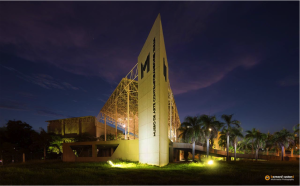
Art practice in a place of turmoil – from a place of multiplication and complexity
Monday, May 15th at 7:30
Place: Stiftelsen 3,14, Bergen
We welcome you to an evening of presentation, screening of video works and conversation about how to engage in contested political processes thorugh artistic and institutional practice.
The evening is organized by Rakett in collaboration with Héctor Piña-Barrios.
PROGRAM:
Presentation by Lourdes Peñaranda director of The Zulia State Museum of Contemporary Art –MACZUL. Venezuela.
Venezuela has experienced an increasingly serious political, economic and social crisis in the latest years. MACZUL is Venezuela´s largest museum infrastructure for Contemporary Art, located in the city of Maracaibo. Despite of the country´s crisis, MACZUL has managed to significantly increase its activity and presence in the community. Peñaranda will speak about how the museum has departed from a policy of reductionism and simplification to a policy of multiplication and complexity. How to avoid the eagerness to control and dominate and rather promote dialogue and negotiation with the realities encountered? By embracing the unexpected, The MACZUL has shifted its institutional practice, normally focused on the permanent collection, and has created the conditions necessary for new ways of collaboration and inclusiveness. MACZUL addresses its future by departing from its shortcomings as the main source of transformation.
Presentation of Utopia Machine by Synsmaskinen/Frans Jacobi and Benedicte Clementsen.
The research-project UTOPIA MACHINE uses the current political situation in Brazil – a possible coup d’etat, an opaque impeachment-process, corruption in the highest places and a fierce new, neo-liberal (coup) government – as a dramatic case story. With a first research-base in Porto Alegre, southern Brazil, the project considers the World Social Forum as a model of political representation. World Social Forum was founded in Porto Alegre in 2001 and held its first global summits here. The initial slogan of the forum – ‘Another World is Possible!’ – is twisted into the ambiguous title of the project, that pinpoints the arguments on both sides of the current ‘state of emergency’ that Brazil seems to be heading into.
In a series of artworks and performative actions the artists participating in UTOPIA MACHINE attempts to visualize and give voice to this deep conflict. What kind of imagination – artistic and political – is needed to challenge a reality of increasing violent, social division?
Discussion/conversation moderated by Åse Løvgren
